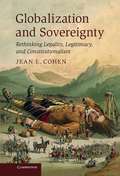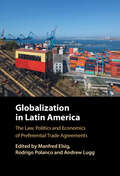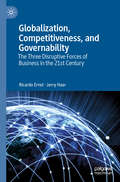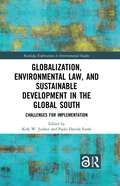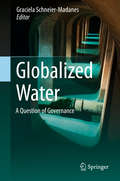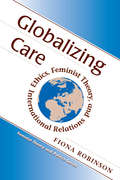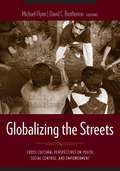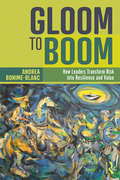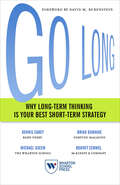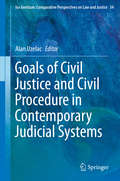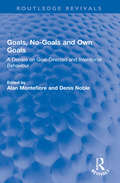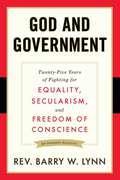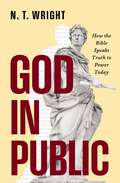- Table View
- List View
Globalization and Sovereignty
by Jean L. CohenSovereignty and the sovereign state are often seen as anachronisms; Globalization and Sovereignty challenges this view. Jean L. Cohen analyzes the new sovereignty regime emergent since the 1990s evidenced by the discourses and practice of human rights, humanitarian intervention, transformative occupation, and the UN targeted sanctions regime that blacklists alleged terrorists. Presenting a systematic theory of sovereignty and its transformation in international law and politics, Cohen argues for the continued importance of sovereign equality. She offers a theory of a dualistic world order comprised of an international society of states, and a global political community in which human rights and global governance institutions affect the law, policies, and political culture of sovereign states. She advocates the constitutionalization of these institutions, within the framework of constitutional pluralism. This book will appeal to students of international political theory and law, political scientists, sociologists, legal historians, and theorists of constitutionalism.
Globalization in Latin America: The Law, Politics and Economics of Preferential Trade Agreements
by Manfred Elsig Rodrigo Polanco Andrew LuggThe approach of Latin American countries to preferential trade agreements (PTAs) is a fascinating topic. There is a rich history of policymakers using PTAs to pursue different economic and political models of integration. What really stands out is the diversity of approaches and attitudes to the use of PTAs. While some countries have been rule-makers and have made innovative attempts to introduce new issues, others have been reluctant to use PTAs. In response to the growing interest in and politicisation of PTAs in the wider public – including renewed consideration of 'with whom to trade' – this book brings together scholars from inside and outside Latin America to address the past, present, and future challenges associated with PTAs. The contributions, from a variety of disciplinary backgrounds, offer new insights into issues related to the design, diffusion, and impact of PTAs. This title is also available as open access on Cambridge Core.
Globalization, Competitiveness, and Governability: The Three Disruptive Forces of Business in the 21st Century
by Jerry Haar Ricardo ErnstThis book argues that three powerful symbiotic forces (globalization, competitiveness, and governability) are disrupting business in the 21st century, resulting in an impact on the economic and business environment far greater than the effects of any of these three individually. Both globalization and competitiveness are governed essentially by market forces that force the introduction of significant changes aimed at increasing efficiency so that a better use may be made of the advantages of globalization (i.e., the traditional “invisible” hand). Responsibility for bringing about these changes lies not only with the private sector but also with the government (i.e., the “visible” hand). Readers will find in this book an explanation of how globalization, competitiveness, and governability define the context of global business.
Globalization, Environmental Law, and Sustainable Development in the Global South: Challenges for Implementation (Routledge Explorations in Environmental Studies)
by Kirk W. JunkerThis volume examines the impact of globalization on international environmental law and the implementation of sustainable development in the Global South. Comprising contributions from lawyers from the Global South or who have experience in the Global South, this volume is organized into three parts, with a thematic inquiry woven through every chapter to ask how law can enable economies that can be sustained, given the limited carrying capacity of the earth. Part I describes and characterizes the status quo of environmental and economic problems in the Global South during the process of globalization. Some of those problems include redistribution of environmental burden on the public through over-reliance on the state in emerging economies and the transition to public-private partnerships, as well as extreme uncontrolled economic expansion. Building on Part I, Part II takes an international perspective by presenting some tools that are in place during the process of globalization that lead to friction and interfaces between developed and developing economies in environmental law. Recognizing the impossibility of a globalized Northern economy, the authors in Part III present some alternatives through framework ideas of human and civil rights, environmental rights, and indigenous persons’ rights, as well as concrete and specific legal tools to strengthen justice and rule of law institutions. The book gives new perspectives to familiar approaches through concrete examples by professional practitioners and theoretical discourse by academic researchers, and can thereby form the basis for changes in practices, as well as further discussions and comparisons. This book will be of great interest to students and scholars of environmental law, sustainable development, and globalization and international relations, as well as legal professionals and practitioners.
Globalization, Wages, and the Quality of Jobs
by Drusilla Brown Raymond Robertson Gaëlle Le Borgne Pierre Maria Laura Sanchez-PuertaSince the early 1990s, most developing economies have become more integrated with the world's economy. Trade and foreign investment barriers have been progressively lifted and international trade agreements signed. These reforms have led to important changes in the structures of these economies. The labor markets have adjusted to these major changes, and workers were required to adapt to them in one way or another. In 2006, the Social Protection Unit of the World Bank launched an important research program to understand the impact that these profound structural changes have had on workers in developing countries. 'Globalization, Wages, and the Quality of Jobs: Five Country Studies' presents the findings and insights of this important research program. In particular, the authors present the similar experiences of low-income countries with globalization and suggest that low-income countries' working conditions have improved in the sectors exposed to globalization. However, 'Globalization, Wages, and the Quality of Jobs' also highlights concerns about the sustainability of these improvements and that the positive demonstration effects on the rest of the economy are unclear. The empirical literature that exists, although vast, does not lead to a consensus view on globalization's eventual impact on labor markets. Understanding the effects of globalization is crucial for governments concerned about employment, working conditions, and ultimately, poverty reduction. Beyond job creation, improving the quality of those jobs is an essential condition for achieving poverty reduction. 'Globalization, Wages, and the Quality of Jobs' adds to the existing literature in two ways. First, the authors provide a comprehensive literature review on the current wisdom on globalization and present a micro-based framework for analyzing globalization and working conditions in developing countries. Second, the authors apply this framework to five developing countries: Cambodia, El Salvador, Honduras, Indonesia, and Madagascar. This volume will be of interest to government policy makers, trade officials, and others working to expand the benefits of globalization to developing countries.
Globalized Water
by Graciela Schneier-MadanesGlobalized Water presents a compilation of voices that forms a unique scientific exploration of contemporary water management models and governance issues. The book describes the water paradox--how a local resource has become a global product--and the implications of this in how we identify challenges and make policy in the water sector. Over the last 20 years, the foundations of local and national water systems have been rocked by a wave of changes. The authors in this book, experts in a wide range of disciplines, address the resulting debates and issues: water as a commodity and patrimony, technological rent, liberalization and privatization, the continuing evolution of water management and policy at the European level, decision making and stakeholder participation, conflict and consensus, and the inevitable growth of counterpowers at the local and international levels, promoted by the advocates of sustainable development. The selected case studies are from Europe (primarily France but also Spain, Germany, the United Kingdom, and Portugal), Latin America (Argentina, Bolivia), the United States, Lebanon, and India. From this diverse collection of comparative perspectives and research methods, Globalized Water seeks to advance interdisciplinary research, contributing to a new and dynamic role for social sciences and governance on water.
Globalizing Care: Ethics, Feminist Theory, and International Relations (Feminist Theory and Politics)
by Fiona Robinson<p>Although there is excellent work being done on ethics/normative theory and international relations and on gender/feminist theory and international relations, very little is available that seeks, explicitly, to integrate the two fields. Moreover, while feminist ethics, which explore the theory of care and noncontractual values such as trust and responsibility, are increasingly linked to political theory, there appears to be a reluctance to relate this moral theory to the specific questions of international or global political theory. <p>In Globalizing Care, Fiona Robinson successfully weaves feminist theory and ethics with international relations. By bringing in the important contributions of feminist moral and political theorists, contributions that are notably absent from most of the important work in this field, Robinson broadens the debate on normative theory in international relations. This text will be essential reading for students and scholars of gender or feminist studies, international relations, philosophy, and political theory and of special interest to scholars of feminist, moral, and political philosophy.</p>
Globalizing the Streets: Cross-Cultural Perspectives on Youth, Social Control, and Empowerment
by Flynn Michael David C. Brotherton Eds.Not since the 1960s have the activities of resistance among lower- and working-class youth caused such anxiety in the international community. Yet today the dispossessed are responding to the challenges of globalization and its methods of social control. The contributors to this volume examine the struggle for identity and interdependence of these youth, their clashes with law enforcement and criminal codes, their fight for social, political, and cultural capital, and their efforts to achieve recognition and empowerment. Essays adopt the vantage point of those whose struggle for social solidarity, self-respect, and survival in criminalized or marginalized spaces. In doing so, they contextualize and humanize the seemingly senseless actions of these youths, who make visible the class contradictions, social exclusion, and rituals of psychological humiliation that permeate their everyday lives.
Gloom to Boom: How Leaders Transform Risk into Resilience and Value
by Andrea Bonime-BlancLeaders – whether in business, government or the nonprofit sector – take risks but often without fully understanding risk at a strategic level. Expanding upon the well-known "ESG" risks, this book explains the key nonfinancial (environmental, social, governance and technological or ESGT) risks. For many leaders (including board members), taking risk without knowledge or preparation can lead to organizational crisis, scandal and value destruction. For those who are prepared, resilience follows and so does the ability to transform ESGT risk into opportunity and value for stakeholders. In this book, global governance, risk, ethics and cyber strategist, author and board member, Andrea Bonime-Blanc, shows practitioners at all levels how to effectively identify and manage their top ESGT risks to avoid crises and transform risk into sustainable long-term resilience and value. Gloom to Boom is a book for everyone – from the highest levels of leadership in an organization (the board, CEO and C-suite), to other senior leaders (the chief risk officer, CFO, general counsel, head of CSR and sustainability, CISO, CHRO), and midlevel leaders, students and folks simply interested in current affairs and the role and impact of strategic risk and opportunity on their lives.
GmbH-Handbuch für den Mittelstand
by Heinz-Peter VerspayDie GmbH ist mit mehr als einer Million Gesellschaften die häufigste Gesellschaftsform für Kapitalgesellschaften in Deutschland. Das große Interesse an ihr beruht auf dem Bedürfnis, die aus der Geschäftstätigkeit folgende Haftung der Gesellschafter auszuschließen. Für Verbindlichkeiten der GmbH haftet deren Gläubigern grundsätzlich nur das Gesellschaftsvermögen. Mit diesem Buch werden die Gründung der GmbH einschließlich der Unternehmergesellschaft (haftungsbeschränkt) und die mit dieser Rechtsform verbundenen Besonderheiten bei den bestehenden Gesellschaften für den Praktiker dargestellt. Das Buch informiert Geschäftsführer und Gesellschafter einer GmbH über ihre Funktionen und ihre Rechte und Pflichten.Die Erstauflage dieses Buches war zum Inkrafttreten der großen GmbH-Reform Ende 2008 fertiggestellt worden. Die von den Fachleuten einhellig begrüßte Reform, mit der die Rechtsform der GmbH durch Deregulierung und Modernisierung attraktiver gemacht werden sollte, warein "großer Wurf". Die 3. Auflage kann sich angesichts der Vielzahl der seitdem ergangenen gerichtlichen Entscheidungen auf eine verfestigte Rechtsprechung stützen. Sie umfasst darüber hinaus die zwischenzeitlich erfolgten Änderungen und Erweiterungen der für die GmbH maßgeblichen Gesetzesbestimmungen. Das Buch setzt keine juristischen Vorkenntnisse voraus. Aufgrund der tiefen Gliederung und des ausführlichen Sachverzeichnisses eignet es sich hervorragend als Nachschlagewerk für den Praktiker.
GmbH-Recht: Was Geschäftsführer und Manager wissen müssen
by Ulrich StacheDer erfahrene Rechtsexperte führt anschaulich in das GmbH-Recht ein und beschreibt u. a. wie man eine GmbH errichtet, welche Verantwortung ein Geschäftsführer hat, welche Fragen sich bei Finanzierung und Rechnungslegung stellen oder welche steuerlichen Vorschriften zu berücksichtigen sind.
Go Legal Yourself!: Know Your Business Legal Lifecycle
by Kelly BaglaAvoid legal pitfalls for your business from day one A common characteristic of entrepreneurs is the attitude: “I’m not going to do that until I absolutely have to.” And it’s understandable why: with limited time and resources it seems logical to focus on tasks like product development, production, marketing, and delivery—the ones that get your product or service out into the marketplace. The last thing you want to do is spend money and effort on legal issues, which is why they often drop to the bottom of the pile. But this can be a costly mistake—and Go Legal Yourself is here to make sure it’s one you avoid. Attorney, inventor, and businesswoman—named Top Woman Entrepreneur by LA Dreams Magazine in 2017—Kelly Bagla knows about doing business from both the entrepreneurial and legal sides of the fence. And in Go Legal Yourself, she guides you through the four key legal lifecycle phases every business experiences—and sets you up for worry-free success from day one. Establish yourself as the correct legal entity Gather and complete the relevant documentation Protect your brand Identify and avoid common (and expensive) pitfalls Plan and manage growth, enter new markets, and keep a sharp competitive edge Wherever you are with your business, this book is your guarantee you have all your legal ducks in a row—and that no nasty legal surprises stand between you and your target: success.
Go Long: Why Long-Term Thinking Is Your Best Short-Term Strategy
by Brian Dumaine Michael Useem David M. Rubenstein Dennis Carey Rodney ZemmelThe lifespans of companies are growing shorter each day. Why do some companies thrive and grow, while others fail? Inspired by the CEO Academy, the annual off-the-record gathering of chief executive officers organized by the authors, Go Long reveals how some of the world’s most prominent business leaders resisted short-term pressures to successfully manage their organizations for the long term, and in turn, aim to create more jobs, more satisfied customers, and more shareholder wealth.In Go Long, authors Dennis Carey, Brian Dumaine, Michael Useem, and Rodney Zemmel take you behind-the-scenes to witness the business decisions that are enabling leading organizations to outsmart and outlast the competition. Why did CEO Larry Merlo allow CVS to take a $2 billion hit—on purpose? How did CEO Alan Mulally maneuver Ford’s $48 billion turnaround? How did director Maggie Wilderotter and her fellow board members engage top management to embark on an unusual exercise to help Hewlett Packard Enterprise build a long-term strategy? Why did CEO Paul Polman’s turn back to Unilever’s original mission of leading with a purpose to fuel profits? How did CEO Ivan Seidenberg convince his investors and board to allow him to make a $150 billion bet? How did CEO George Buckley find a way to address investor calls for 3M to spend less on research and development while still finding a way to innovate?These leaders argue that a short-term mindset might satisfy investors for this quarter or next, but there’s a heavy price to be paid. Instead, they argue, long-term thinking is your best short-term strategy.Called a “mandatory read” by David M. Rubenstein, co-founder and co-executive chairman of The Carlyle Group, Go Long is a critical resource for leaders who want their organizations to survive over the long-term and for anyone who cares about the global economy.
Go Slowly, Breathe and Smile: Dharma Art by Rashani Réa with the Wisdom of Thich Nhat Hanh
by Thich Nhat Hanh Rashani RéaA Book of Mindfulness, Kindfulness, and Words of Wisdom“Rashani’s extraordinary collages perfectly mirror Thich Nhat Hanh’s simple yet powerful teachings. An exquisite collection.” —James Baraz, author of Awakening Joy#1 New Release in Zen Philosophy, Stress Management, Meditation, and Mental & Spiritual HealingThich Nhat is a spiritual luminary, second only to the Dalai Lama, and is globally renowned and admired. His words of wisdom are centralized in finding peace in every moment; whether you’re stopped at a red light or answering a phone, mindfulness grounds you into the present moment.Start your day with these peaceful, empowering words of wisdom. All of these words are interwoven with meditative, inspiring images of celebration. Each page is designed to increase positive thinking and improve your mental health.Life-changing mindful meditations. Strengthen your mindset with these empowering words of wisdom that are referenced as essential advice for how to grow spirituality and mentally strong. Meditation practices are essential to building mindfulness.Go Slowly, Breathe and Smile is a unique convergence of wisdom and art, a beautiful tribute from a dedicated student to her teacher. Absorb Thich Nhat Hanh's words of wisdom and meditate on Rashani Réa's inspirational collages, and allow these pages to illuminate your heart and mind, inspire mindfulness, and reduce stress levels.Read Go Slowly, Breathe, and Smile and find:Encouraging words of advice from the Wisest Monk Thich Nhat HanhWords of wisdom to thrive in the mind and bodyBeautiful art by social activist Rashani RéaLife lessons and tools for mindful meditationsThich Nhat Hanh’s other books include the bestselling Peace Is Every Step; No Mud, No Lotus; and How to Love. Rashani Réa's other books include Nurses Cry Too and The Threshold Between Loss and Revelation. If you liked The Heart of the Buddha's Teaching, or The Miracle of Mindfulness, you’ll love Go Slowly, Breathe and Smile.
Goals of Civil Justice and Civil Procedure in Contemporary Judicial Systems
by Alan UzelacThis book is a collection of papers that address a fundamental question: What is the role of civil justice and civil procedure in the various national traditions in the contemporary world? The book presents striking differences among a range of countries and legal traditions, but also points to common trends and open issues. It brings together prominent experts, professionals and scholars from both civil and common law jurisdictions. It represents all main legal traditions ranging from Europe (Germanic and Romanic countries, Scandinavia, ex-Socialist countries) and Russia to the Americas (North and South) and China (Mainland and Hong Kong). While addressing the main issue - the goals of civil justice - the book discusses the most topical concerns regarding the functioning and efficiency of national systems of civil justice. These include concerns such as finding the appropriate balance between accurate fact-finding and the right to a fair trial within a reasonable time, the processing of hard cases and the function of civil justice as a specific public service. In the mosaic of contrasts and oppositions special place is devoted to the continuing battle between the individualistic/liberal approach and the collectivist/paternalistic approach - the battle in which, seemingly, paternalistic tendencies regain momentum in a number of contemporary justice systems.
Goals, No-Goals and Own Goals: A Debate on Goal-Directed and Intentional Behaviour (Routledge Revivals)
by Alan Montefiore; Denis NobleFirst published in 1989, Goals, No-Goals and Own Goals presents a stimulating debate between three scientists and three philosophers about the significance and nature of goal-directed and intentional behaviour. At one extreme David McFarland brings into radical question the need for either of these concepts, at least in the scientific study of animal behaviour. At the other extreme, Alan Montefiore argues that such concepts are indispensable to any explication of the meaningful use of language and that we must therefore acknowledge their importance in understanding the nature of human behaviour. Denis Noble uses arguments drawn from computer science and physiology to show that it is incorrect to regard intentions as causes of neural events, even though it is correct to regard intentionality as responsible for our actions. Shawn Lockery outlines how intentional behaviour might be subjected to physiological study. Kathy Wilkes widens the debate by asking some basic questions about the nature of explanation and finally, Daniel Dennett argues how the study of animal behaviour might inform research in Artificial Intelligence. This book will be a useful resource for scholars and researchers of cognitive science, philosophy, psychology, linguistics and physiology.
God Forbid: Religion and Sex in American Public Life
by Kathleen M. SandsSince the 1980s, religion has been most visible in American public life when issues of sexuality and reproduction are at stake. Paradoxically, however, the voices that speak most loudly in the name of religion are often unschooled in religious history, world religions, theology, or ethics. As a result, religion in America is misrepresented as anxiously and obsessively concerned with sex, and as uniformly supporting the conservative agenda of "family values." This volume corrects that distortion in American public discourse. Its thirteen previously unpublished articles introduce scholarly perspectives on issues including the family, gay rights, abortion, welfare policy, prostitution, and assisted reproduction. They richly display the complexities and conflicts that exist not only between but within America's various religious traditions--for example, the pro-choice strain within Christian history, the support of many religious denominations for gay rights, and the criticism of patriarchal family structures within religious communities past and present. In these essays, contributors put forth views of sexual ethics that are just and compassionate, respectful of cultural pluralism, and attentive to democratic processes. Thoroughly researched, lucidly written, and carefully argued, this anthology will debunk the claims of the Religious Right to be the only "religious" word on sexuality in America.
God Goes to Work
by Tom ZenderYour most important business asset is already within you - realize it and capitalize on itSpirituality is the basis for all successful organizations and the most important asset you have in elevating you and your business to a new level of performance. The most successful individuals and firms in the world are changing the way they do business, in order to access a vast resevoir of untapped energy. You too can join the revolution, because the tools these people are utilizing are found inside each and every one of us. Tom Zender, President Emeritus of Unity - a spiritual organization serving over three million individuals - and veteran corporate executive, reveals simple ways that you can use to find yourself suddenly on the inside edge.God Goes to Work lays out how the world rediscovered the essence of the most effective transactions and how you can implement these methods into the way you do business. This groundbreaking text gives you practical steps on how, no matter what you believe, you can learn to use your spiritual assets in business to achieve better things with greater ease. You'll discoverHow to make better, more profitable deals in business.The secret behind the world's most effective managers, executives and leaders, so that you can become one yourself.Simple steps to prepare your organization - no matter the size - to take advantage of the wondrous prospects that await it in this new economy.The world is finally ready to discover that spirituality is the very basis of all our most profitable business transactions. God Goes to Work gives you the practical roadmap to utilize this amazing, untapped resource for breakthrough business results.
God and Government: Twenty-Five Years of Fighting for Equality, Secularism, and Freedom Of Conscience
by Barry W. LynnA central player in every major church-state-separation battle for decades, the Rev. Barry W. Lynn understands the complexities of this divisive issue like few others. As a long-time activist, a civil rights lawyer, and an ordained minister in the United Church of Christ, he offers a unique perspective and a wealth of experience on church-state controversies. In this lively book, he has compiled his writings from various sources to explore in depth the many ways religious extremists have attempted to erode individual liberties. The topics range from publicly-promoted prayer to efforts to undermine public education and replace it with taxpayer-subsidized vouchers for religious schools, interfering with end-of-life and reproductive rights, censorship, and belligerence directed against nonbelievers and minorities. Lynn concludes that the ultimate goal of these extremist forces-consisting mainly of the Protestant Religious Right and the Roman Catholic hierarchy-is the creation of a corporate theocracy, a decidedly undemocratic system of government in which nonconservative Christians, along with humanist, feminists, and the LGBTQ community, are relegated to second-class status in America.
God and the Moral Life
by Myriam Renaud Joshua DanielHow do various concepts of God impact the moral life? Is God ultimately required for goodness? In this edited collection, an international panel of contemporary philosophers and theologians offer new avenues of exploration from a theist perspective for these important questions. The book features several approaches to address these questions. Common themes include philosophical and theological conceptions of God with reference to human morality, particular Trinitarian accounts of God and the resultant ethical implications, and how communities are shaped, promoted, and transformed by accounts of God. Bringing together philosophical and theological insights on the relationship between God and our moral lives, this book will be of keen interest to scholars of the philosophy of religion, particularly those looking at ethics, social justice and morality.
God in Public: How the Bible Speaks Truth to Power Today
by N. T. WrightDrawing on a collection of lectures that N. T. Wright delivered from 1999 to 2015, God in Public brings together the message of Jesus--in its larger biblical context--and the challenges of the contemporary public and political worlds.In this book, Wright challenges the West's response to 9/11 and then expands to discuss a more Jesus-inspired way of approaching the public problems we find ourselves in, based on following Jesus' life and teachings.As Wright demonstrates the many ways in which faithful exegesis of scripture can throw fresh light--God's light--on the great philosophical and ethical problems of our day, he discusses urgent questions such as: What has Christianity to do with power?Why must the church remind those in authority of their responsibilities?What can Christians do to act as the voice of the voiceless?
God is Dead. God Remains Dead. And We Have Killed Him. (Penguin Great Ideas)
by Friedrich Nietzsche'We have left dry land and put out to sea! We have burned the bridge behind us - what is more, we have burned the land behind us!'Nietzsche's devastating demolition of religion would have seismic consequences for future generations. With God dead, he envisages a brilliant future for humanity: one in which individuals would at last be responsible for their destinies.One of twenty new books in the bestselling Penguin Great Ideas series. This new selection showcases a diverse list of thinkers who have helped shape our world today, from anarchists to stoics, feminists to prophets, satirists to Zen Buddhists.
God on Trial
by Peter IronsAn insightful and dramatic account of religious conflicts that keep America divided?from the acclaimed author of The Courage of Their Convictions As the United States has become increasingly conservative, both politically and socially, in recent years, the fight between the religious right and those advocating for the separation of church and state has only intensified. As he did in The Courage of Their Convictions, award-winning author and legal expert Peter Irons combines an approachable, journalistic narrative style with intimate first-person accounts from both sides of the conflict. Set against the backdrop of American history, politics, and law, God on Trial relates the stories of six recent cases in communities that have become battlefields in America?s growing religious wars.
God on Trial
by Peter IronsAn insightful and dramatic account of religious conflicts that keep America divided?from the acclaimed author of The Courage of Their Convictions As the United States has become increasingly conservative, both politically and socially, in recent years, the fight between the religious right and those advocating for the separation of church and state has only intensified. As he did in The Courage of Their Convictions, award-winning author and legal expert Peter Irons combines an approachable, journalistic narrative style with intimate first-person accounts from both sides of the conflict. Set against the backdrop of American history, politics, and law, God on Trial relates the stories of six recent cases in communities that have become battlefields in America?s growing religious wars.
God vs. The Gavel
by Marci A. Hamilton Marci A. Hamilton Paul R. Verkuil Benjamin N. Cardozo Paul R. VerkuilGod vs. the Gavel challenges the pervasive assumption that all religious conduct deserves constitutional protection. While religious conduct provides many benefits to society, it is not always benign. The thesis of the book is that anyone who harms another person should be governed by the laws that govern everyone else - and truth be told, religion is capable of great harm.
